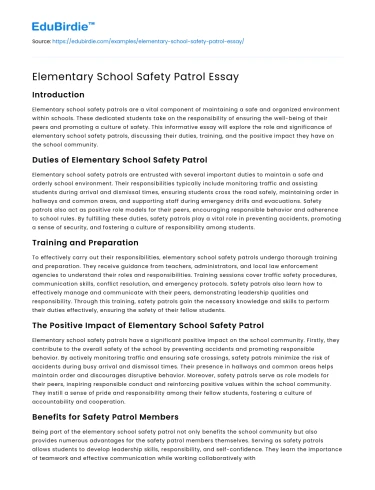Introduction
Elementary school safety patrols are a vital component of maintaining a safe and organized environment within schools. These dedicated students take on the responsibility of ensuring the well-being of their peers and promoting a culture of safety. This informative essay will explore the role and significance of elementary school safety patrols, discussing their duties, training, and the positive impact they have on the school community.
Duties of Elementary School Safety Patrol
Elementary school safety patrols are entrusted with several important duties to maintain a safe and orderly school environment. Their responsibilities typically include monitoring traffic and assisting students during arrival and dismissal times, ensuring students cross the road safely, maintaining order in hallways and common areas, and supporting staff during emergency drills and evacuations. Safety patrols also act as positive role models for their peers, encouraging responsible behavior and adherence to school rules. By fulfilling these duties, safety patrols play a vital role in preventing accidents, promoting a sense of security, and fostering a culture of responsibility among students.
Training and Preparation
To effectively carry out their responsibilities, elementary school safety patrols undergo thorough training and preparation. They receive guidance from teachers, administrators, and local law enforcement agencies to understand their roles and responsibilities. Training sessions cover traffic safety procedures, communication skills, conflict resolution, and emergency protocols. Safety patrols also learn how to effectively manage and communicate with their peers, demonstrating leadership qualities and responsibility. Through this training, safety patrols gain the necessary knowledge and skills to perform their duties effectively, ensuring the safety of their fellow students.
The Positive Impact of Elementary School Safety Patrol
Elementary school safety patrols have a significant positive impact on the school community. Firstly, they contribute to the overall safety of the school by preventing accidents and promoting responsible behavior. By actively monitoring traffic and ensuring safe crossings, safety patrols minimize the risk of accidents during busy arrival and dismissal times. Their presence in hallways and common areas helps maintain order and discourages disruptive behavior. Moreover, safety patrols serve as role models for their peers, inspiring responsible conduct and reinforcing positive values within the school community. They instill a sense of pride and responsibility among their fellow students, fostering a culture of accountability and cooperation.
Benefits for Safety Patrol Members
Being part of the elementary school safety patrol not only benefits the school community but also provides numerous advantages for the safety patrol members themselves. Serving as safety patrols allows students to develop leadership skills, responsibility, and self-confidence. They learn the importance of teamwork and effective communication while working collaboratively with their peers and school staff. Safety patrols also gain a sense of accomplishment and satisfaction from actively contributing to the well-being of their school community.
Conclusion
Elementary school safety patrols play a crucial role in ensuring the safety and well-being of students. Their dedication, training, and responsible conduct contribute to maintaining an orderly and secure school environment. By monitoring traffic, assisting students, and promoting responsible behavior, safety patrols create a culture of safety and accountability within the school community. Additionally, safety patrol members themselves benefit from the experience by developing valuable leadership skills and a sense of responsibility. The presence of elementary school safety patrols enhances the overall safety and positive atmosphere within the school, fostering an environment conducive to learning and growth.






 Stuck on your essay?
Stuck on your essay?

